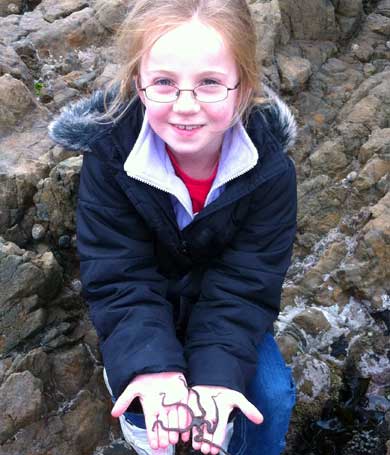Archived content: This media release was accurate on the date of publication.
Date: 05 July 2016

Hannah with brittle star
Image: Leigh-Anne Wiig | DOC
Children from early childhood centres, primary schools and community groups throughout the country are being encouraged think about how they could make a difference to their local environment.
DOC is running a national competition called 'Habitat Heroes' which requires students to investigate the health of their local environment and come up with ideas about how they could improve it.
DOC’s Outreach and Education Manager Anita Anderson says, “We want to spark an interest and enthusiasm for conservation in children, while showing teachers how easy it is to link conservation activities with the school curriculum.”
Four winning groups will receive $750 in vouchers to contribute to a local conservation action. The winners will be announced during Conservation Week in September.
Last year’s winner was a Year 8 class from Katikati College in the Western Bay of Plenty, which ran a project to restore a gully which backs onto the school. The students’ aim was to bring more kereru and other native birds back to their college.
Anita Anderson says the class came up with a plan to clear rubbish and weeds from the gully and to replant it with native trees. They also planted grasses along the stream edge to reduce the amount of sediment entering the stream.
“The students learned about how to test water quality, monitor for pests and encourage more native insects and birds back to the area,” she says.
“The great thing about this project is that it’s ongoing,” says Anderson. “The students now have a clear connection with their local area and will be working to keep restoring it.”
The DOC website has plenty of curriculum links and activities for young people to do at school and at home.
The Habitat Heroes competition runs until the end of Conservation Week on 18 September. This year’s Conservation Week theme is Healthy Nature, Healthy People and there’s a call for people to ‘join the team’ and get involved in conservation.
“There’s an intrinsic link between the health of our nature and the health of our people,” Anderson says. “The earlier on we can get children to be aware of the benefits of conservation, the more they’re going to value it.”
“It’s a chance to help our children become conservation champions for the future.”
Contact
For media enquiries contact:
Email: media@doc.govt.nz